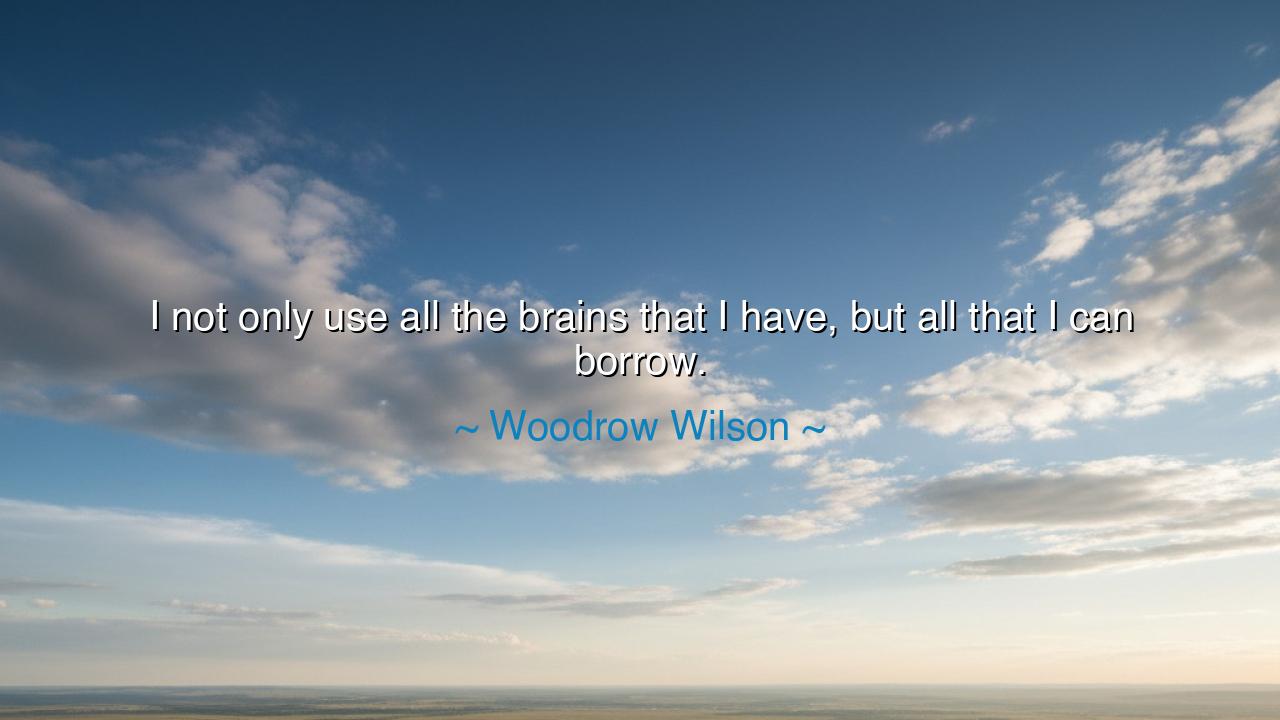
I not only use all the brains that I have, but all that I can






“I not only use all the brains that I have, but all that I can borrow.” — Woodrow Wilson, the scholar-president, the man who led nations through the tempest of the Great War and sought to shape a peace that would outlast blood and time. In these words lies a truth older than kingdoms: that no man, however wise, is sufficient unto himself. The mind is vast, yet its boundaries are known; wisdom begins when a man learns to borrow the light of other minds. Wilson’s saying is not a confession of weakness, but an anthem of humility — a declaration that the strength of one grows infinitely when joined to the strength of many.
In the world of the ancients, the wisest among men were not those who spoke alone, but those who listened. The philosopher gathered disciples not to rule them, but to draw thought from their speech; the king who sought counsel from his elders did not lose power, he multiplied it. So Wilson’s words echo the wisdom of ages: that the mind which borrows, learns; the mind which hoards, decays. To use all the brains that you can borrow is to admit that truth lies not in one vessel but in the harmony of many. It is the humility that transforms knowledge into wisdom and ambition into greatness.
When Wilson governed, he did so not as a solitary sage but as the conductor of intellects. A historian by training, a professor by heart, he surrounded himself with scholars, strategists, and reformers — men and women whose knowledge bridged what his could not. During the forging of the League of Nations, when the world hung between hope and ruin, he drew from minds across continents, seeking the counsel of philosophers, diplomats, and dreamers. He knew that one mind could not heal the wounds of the earth, but many might. Though the League itself faltered, the idea endured, because it was born from many minds united — an inheritance of collective wisdom that would one day inspire the United Nations.
Consider too the tale of Alexander the Great, conqueror of worlds. Though his sword cut swift, it was not the blade alone that conquered. It was the mind of Aristotle, his teacher, who taught him the shape of the earth, the nature of men, the order of the cosmos. Alexander rode not only with armies, but with the wisdom he had borrowed. His empire fell, but his vision of blending East and West, of fusing wisdom and might, lived on. From the borrowed intellect of another, he gained the breadth to think beyond the sword. Thus do the greatest souls walk — not alone, but guided by the stars of other minds.
To borrow brains is to recognize that greatness is a shared creation. The farmer learns from the sky, the sailor from the sea, the artist from silence. The leader who listens commands more power than the tyrant who shouts. The student who asks a question grows wiser than the teacher who refuses to learn. For intelligence is not a mountain to be climbed and owned, but a river — and the more streams that join it, the stronger it flows. The proud man says, “I know”; the wise man says, “Teach me.”
Yet there is courage in such humility. It takes strength to admit that your wisdom is incomplete. Many fear to seek help, lest they seem weak — but those who refuse to borrow minds walk alone in darkness, while those who gather counsel build empires of light. Every great invention, every act of progress, is born of minds joined together — the bridge between one man’s dream and another’s understanding. To use all the brains that you can borrow is to take part in the grand fellowship of humanity’s genius.
So, my child of the future, learn this: never be too proud to seek another’s wisdom. Ask questions, listen with reverence, and draw from the experience of those who came before you. Read deeply, not to boast, but to learn; speak with the humble, for they often carry truths the mighty forget. Build a circle of minds brighter than your own, and let their fire ignite your thought. For the man who borrows wisely becomes not less himself, but more — a living vessel of the world’s knowledge.
For in the end, there is no shame in borrowing wisdom; there is only folly in refusing it. The mind that shares and gathers grows eternal, while the one that hoards dies alone. As Woodrow Wilson taught, your own intellect is the spark — but the borrowed light of others makes it a flame that can warm the world.






AAdministratorAdministrator
Welcome, honored guests. Please leave a comment, we will respond soon